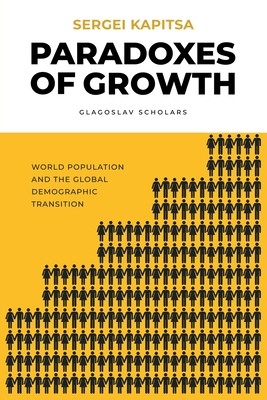
- We will send in 10–14 business days.
- Author: Sergei Kapitsa
- Publisher: GLAGOSLAV PUBLICATIONS B.V.
- Year: 2017
- ISBN-10: 1782671218
- ISBN-13: 9781782671213
- Format: 15.2 x 22.9 x 1 cm, minkšti viršeliai
- Language: English
- SAVE -10% with code: EXTRA
Reviews
Description
In this book, the famous Russian scientist, Sergei Kapitsa, explains complicated theories in an uncomplicated manner that is easily accessible to readers with no specialist knowledge. The author focuses on the processes taking place inside the global demographic revolution and on the destinies of nations, mankind and our planet as a whole.
The author cites a number of facts and assessments concerning not only projections for population growth, but also a common view on the causes of the current and future crises, and on food and energy problems.
The book Paradoxes of Growth addresses the vital problems of a global demographic revolution, when humanity moves into a period of limited reproduction. The answer to the questions of why this happens, and what the consequences of it might be, affects not only the distant future, but also our approach to solving the problems of modernity, and in particular our analysis of the causes and results of the global crisis.
In his book, Sergei Kapitsa examines the concept of the model and the main results of the mathematical modelling which led to the theory of growth of the world's population, and offers an interpretation of history and of the development of humanity, the present and the future that likely awaits us. The discussion of global issues is not intended to be a comprehensive analysis; rather, it serves to reveal the opportunities offered by a quantitative analysis of the history of the world. The concept developed by Kapitsa concerns human civilization as a whole and may provide certain forecasts for communities - in the broadest sense of the world - and nations, as well.
Translated by Inna Tsys.
Edited by Scott Moss and Huw Davies.
EXTRA 10 % discount with code: EXTRA
The promotion ends in 22d.00:28:45
The discount code is valid when purchasing from 10 €. Discounts do not stack.
- Author: Sergei Kapitsa
- Publisher: GLAGOSLAV PUBLICATIONS B.V.
- Year: 2017
- ISBN-10: 1782671218
- ISBN-13: 9781782671213
- Format: 15.2 x 22.9 x 1 cm, minkšti viršeliai
- Language: English English
In this book, the famous Russian scientist, Sergei Kapitsa, explains complicated theories in an uncomplicated manner that is easily accessible to readers with no specialist knowledge. The author focuses on the processes taking place inside the global demographic revolution and on the destinies of nations, mankind and our planet as a whole.
The author cites a number of facts and assessments concerning not only projections for population growth, but also a common view on the causes of the current and future crises, and on food and energy problems.
The book Paradoxes of Growth addresses the vital problems of a global demographic revolution, when humanity moves into a period of limited reproduction. The answer to the questions of why this happens, and what the consequences of it might be, affects not only the distant future, but also our approach to solving the problems of modernity, and in particular our analysis of the causes and results of the global crisis.
In his book, Sergei Kapitsa examines the concept of the model and the main results of the mathematical modelling which led to the theory of growth of the world's population, and offers an interpretation of history and of the development of humanity, the present and the future that likely awaits us. The discussion of global issues is not intended to be a comprehensive analysis; rather, it serves to reveal the opportunities offered by a quantitative analysis of the history of the world. The concept developed by Kapitsa concerns human civilization as a whole and may provide certain forecasts for communities - in the broadest sense of the world - and nations, as well.
Translated by Inna Tsys.
Edited by Scott Moss and Huw Davies.


Reviews